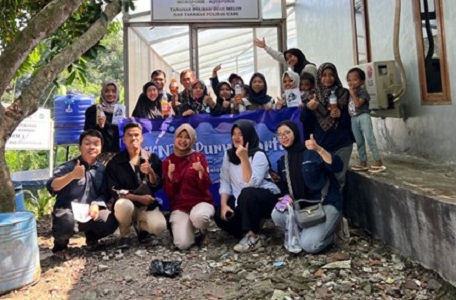IPB University Innovation Real-Thematic Work Lecture students along with Jatimekar Village Women Farmers Group Utilize Organic Waste to become Liquid Organic Fertilizer

The Thematic Real Work Lecture Group (KKN-T) of IPB University Innovation students held a training on making liquid organic fertilizer (POC) with a group of women farmers (KWT) and the people of Jatimekar Village, Purwakarta Regency, West Java to utilize organic waste.
"Waste is a residual material/substance that is disposed of or wasted and does not yet have economic value. Organic waste is a type of waste that can be decomposed, such as leaves, food scraps, vegetables and so on," said Dodi as the student coordinator of the Innovation Real-Thematic Work Lecture.
Organic waste is always generated every day, so it needs to be processed so that it does not become a source of disease. One way to treat organic waste is by using a technological approach, for example, turning it into POC. POC contains macro nutrients such as phosphorus, nitrogen, potassium and other micro nutrients needed by plants that can improve nutrients in the soil.
“A lot of kitchen waste that keeps piling up is a common problem faced by every village. Therefore, we took the initiative to process the kitchen waste into useful items. This POC has many uses, such as fertilizing, loosening, and enriching soil microorganisms," explained Dodi.
Apart from that, he continued, liquid organic fertilizer can also be used to sanitize bathrooms, toilets and kitchens. Its use is also very easy, just by mixing liquid organic fertilizer with air wells and then spraying it on the desired area.
“The process of making liquid organic fertilizer is very easy. The material used is in the form of organic waste such as vegetables, pineapple skin, watermelon, melon and so on. Then the material is chopped and then washed thoroughly. Then mix it with ¼ liter of molasses or it can be replaced with 400 grams of brown sugar, 400 grams of rice washing water, 10 liters of clean water and ½ liter of EM4," explained Dodi.
These ingredients are then put into an airtight bucket or barrel to be fermented for 6 days. After the hardening process, POC is ready to be used for agricultural crops, fruits, and sanitation.
This training activity was well received by KWT and the Jatimekar Village community. Komariah as the Head of KWT conveyed her impression after participating in the activity. She admitted that she gained new knowledge and understood the steps for making POC.
"Hopefully activities like this can continue after Innovation Real-Thematic Work Lecture students return to campus and share knowledge for agricultural development in Jatimekar Village," she added. (*/Rz) (IAAS/SND).



